Organizational Behaviour Report: Waitrose Culture, Power, Politics
VerifiedAdded on 2020/12/18
|20
|6702
|411
Report
AI Summary
This report provides a comprehensive analysis of organizational behaviour within Waitrose, a British supermarket chain. It examines the influence of culture, politics, and power on employee and team behaviour. The report delves into different organizational culture types, including task, role, person, and power cultures, and their impact on motivation and performance. It explores the effects of workplace politics and various types of power (reward, coercive, etc.) on employees. The report also evaluates motivation theories and techniques to achieve goals effectively. Furthermore, it differentiates between effective and ineffective teams and analyzes team development theories to enhance cooperation. Finally, the report applies organizational behaviour concepts and philosophies to a business context, evaluating their positive and negative influences on behaviour and making recommendations for Waitrose.
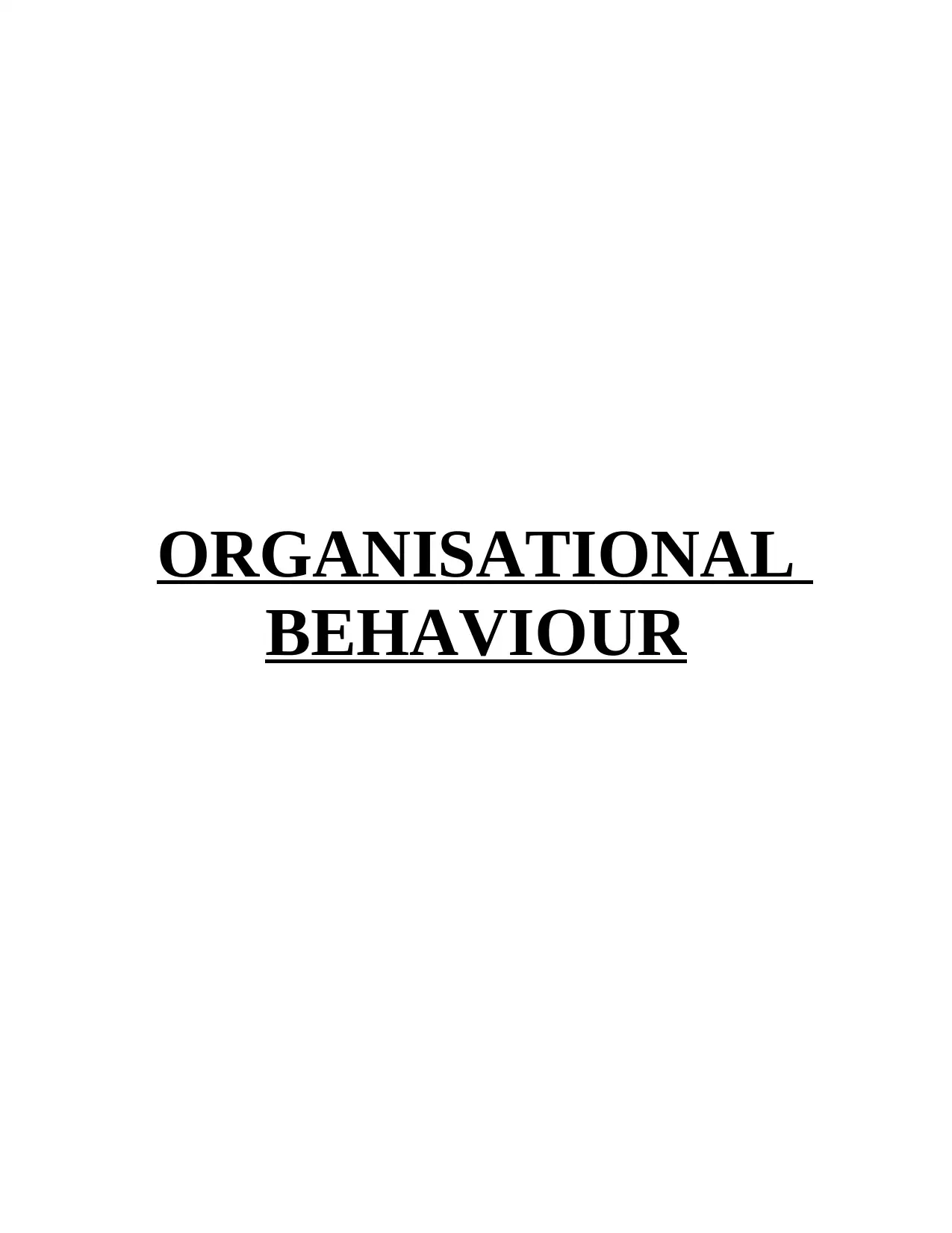
ORGANISATIONAL
BEHAVIOUR
BEHAVIOUR
Paraphrase This Document
Need a fresh take? Get an instant paraphrase of this document with our AI Paraphraser
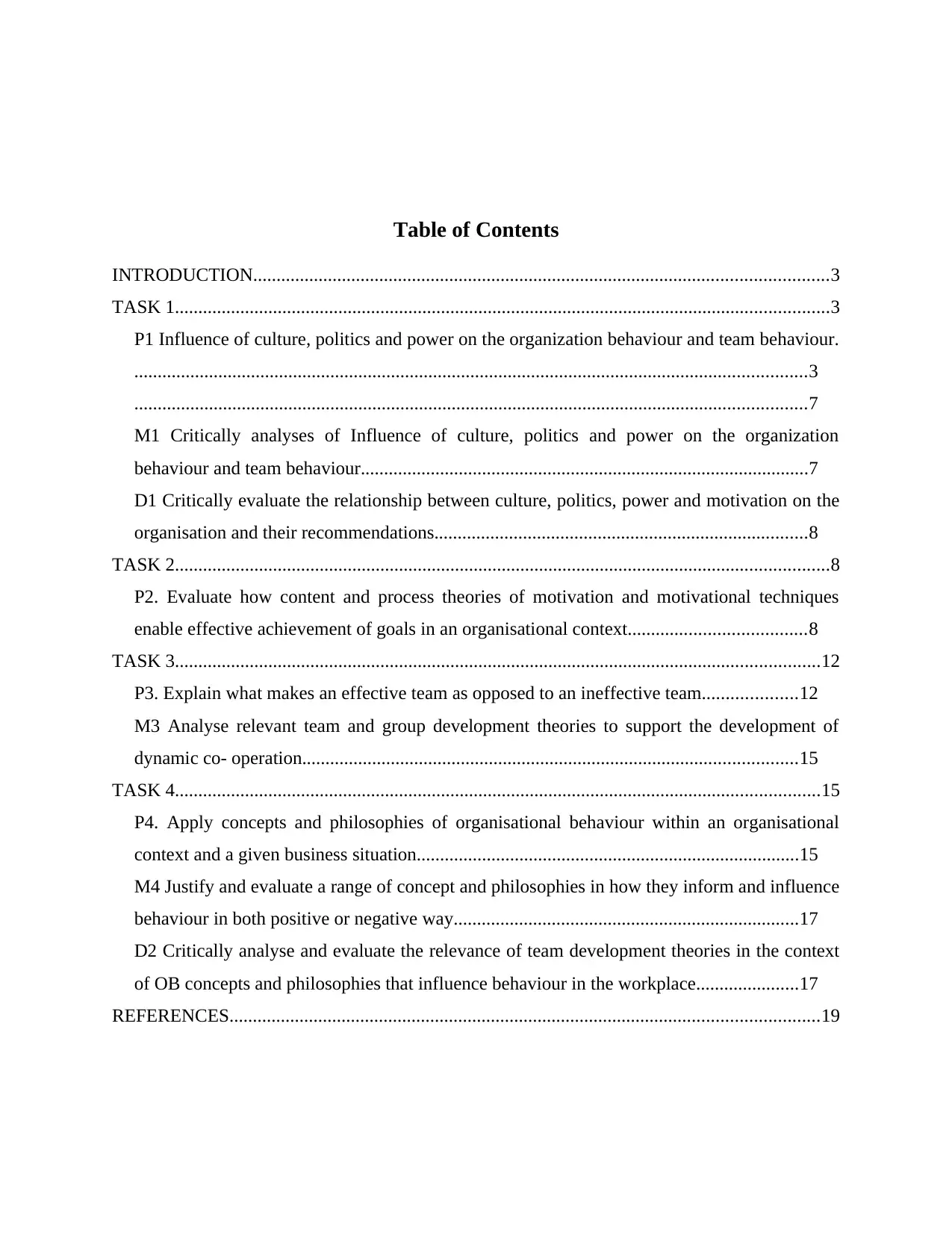
Table of Contents
INTRODUCTION...........................................................................................................................3
TASK 1............................................................................................................................................3
P1 Influence of culture, politics and power on the organization behaviour and team behaviour.
................................................................................................................................................3
................................................................................................................................................7
M1 Critically analyses of Influence of culture, politics and power on the organization
behaviour and team behaviour................................................................................................7
D1 Critically evaluate the relationship between culture, politics, power and motivation on the
organisation and their recommendations................................................................................8
TASK 2............................................................................................................................................8
P2. Evaluate how content and process theories of motivation and motivational techniques
enable effective achievement of goals in an organisational context......................................8
TASK 3..........................................................................................................................................12
P3. Explain what makes an effective team as opposed to an ineffective team....................12
M3 Analyse relevant team and group development theories to support the development of
dynamic co- operation..........................................................................................................15
TASK 4..........................................................................................................................................15
P4. Apply concepts and philosophies of organisational behaviour within an organisational
context and a given business situation..................................................................................15
M4 Justify and evaluate a range of concept and philosophies in how they inform and influence
behaviour in both positive or negative way..........................................................................17
D2 Critically analyse and evaluate the relevance of team development theories in the context
of OB concepts and philosophies that influence behaviour in the workplace......................17
REFERENCES..............................................................................................................................19
INTRODUCTION...........................................................................................................................3
TASK 1............................................................................................................................................3
P1 Influence of culture, politics and power on the organization behaviour and team behaviour.
................................................................................................................................................3
................................................................................................................................................7
M1 Critically analyses of Influence of culture, politics and power on the organization
behaviour and team behaviour................................................................................................7
D1 Critically evaluate the relationship between culture, politics, power and motivation on the
organisation and their recommendations................................................................................8
TASK 2............................................................................................................................................8
P2. Evaluate how content and process theories of motivation and motivational techniques
enable effective achievement of goals in an organisational context......................................8
TASK 3..........................................................................................................................................12
P3. Explain what makes an effective team as opposed to an ineffective team....................12
M3 Analyse relevant team and group development theories to support the development of
dynamic co- operation..........................................................................................................15
TASK 4..........................................................................................................................................15
P4. Apply concepts and philosophies of organisational behaviour within an organisational
context and a given business situation..................................................................................15
M4 Justify and evaluate a range of concept and philosophies in how they inform and influence
behaviour in both positive or negative way..........................................................................17
D2 Critically analyse and evaluate the relevance of team development theories in the context
of OB concepts and philosophies that influence behaviour in the workplace......................17
REFERENCES..............................................................................................................................19
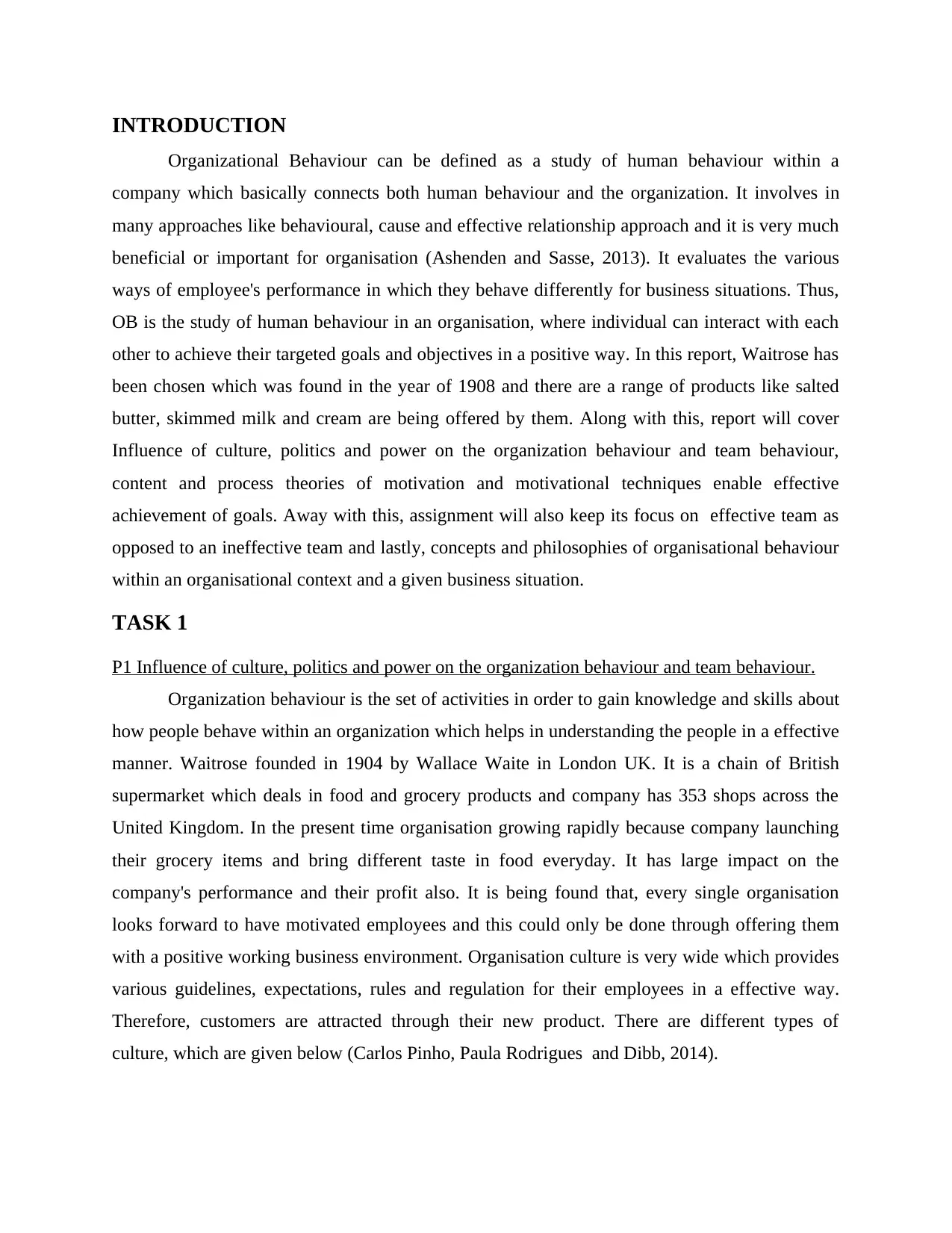
INTRODUCTION
Organizational Behaviour can be defined as a study of human behaviour within a
company which basically connects both human behaviour and the organization. It involves in
many approaches like behavioural, cause and effective relationship approach and it is very much
beneficial or important for organisation (Ashenden and Sasse, 2013). It evaluates the various
ways of employee's performance in which they behave differently for business situations. Thus,
OB is the study of human behaviour in an organisation, where individual can interact with each
other to achieve their targeted goals and objectives in a positive way. In this report, Waitrose has
been chosen which was found in the year of 1908 and there are a range of products like salted
butter, skimmed milk and cream are being offered by them. Along with this, report will cover
Influence of culture, politics and power on the organization behaviour and team behaviour,
content and process theories of motivation and motivational techniques enable effective
achievement of goals. Away with this, assignment will also keep its focus on effective team as
opposed to an ineffective team and lastly, concepts and philosophies of organisational behaviour
within an organisational context and a given business situation.
TASK 1
P1 Influence of culture, politics and power on the organization behaviour and team behaviour.
Organization behaviour is the set of activities in order to gain knowledge and skills about
how people behave within an organization which helps in understanding the people in a effective
manner. Waitrose founded in 1904 by Wallace Waite in London UK. It is a chain of British
supermarket which deals in food and grocery products and company has 353 shops across the
United Kingdom. In the present time organisation growing rapidly because company launching
their grocery items and bring different taste in food everyday. It has large impact on the
company's performance and their profit also. It is being found that, every single organisation
looks forward to have motivated employees and this could only be done through offering them
with a positive working business environment. Organisation culture is very wide which provides
various guidelines, expectations, rules and regulation for their employees in a effective way.
Therefore, customers are attracted through their new product. There are different types of
culture, which are given below (Carlos Pinho, Paula Rodrigues and Dibb, 2014).
Organizational Behaviour can be defined as a study of human behaviour within a
company which basically connects both human behaviour and the organization. It involves in
many approaches like behavioural, cause and effective relationship approach and it is very much
beneficial or important for organisation (Ashenden and Sasse, 2013). It evaluates the various
ways of employee's performance in which they behave differently for business situations. Thus,
OB is the study of human behaviour in an organisation, where individual can interact with each
other to achieve their targeted goals and objectives in a positive way. In this report, Waitrose has
been chosen which was found in the year of 1908 and there are a range of products like salted
butter, skimmed milk and cream are being offered by them. Along with this, report will cover
Influence of culture, politics and power on the organization behaviour and team behaviour,
content and process theories of motivation and motivational techniques enable effective
achievement of goals. Away with this, assignment will also keep its focus on effective team as
opposed to an ineffective team and lastly, concepts and philosophies of organisational behaviour
within an organisational context and a given business situation.
TASK 1
P1 Influence of culture, politics and power on the organization behaviour and team behaviour.
Organization behaviour is the set of activities in order to gain knowledge and skills about
how people behave within an organization which helps in understanding the people in a effective
manner. Waitrose founded in 1904 by Wallace Waite in London UK. It is a chain of British
supermarket which deals in food and grocery products and company has 353 shops across the
United Kingdom. In the present time organisation growing rapidly because company launching
their grocery items and bring different taste in food everyday. It has large impact on the
company's performance and their profit also. It is being found that, every single organisation
looks forward to have motivated employees and this could only be done through offering them
with a positive working business environment. Organisation culture is very wide which provides
various guidelines, expectations, rules and regulation for their employees in a effective way.
Therefore, customers are attracted through their new product. There are different types of
culture, which are given below (Carlos Pinho, Paula Rodrigues and Dibb, 2014).
⊘ This is a preview!⊘
Do you want full access?
Subscribe today to unlock all pages.

Trusted by 1+ million students worldwide
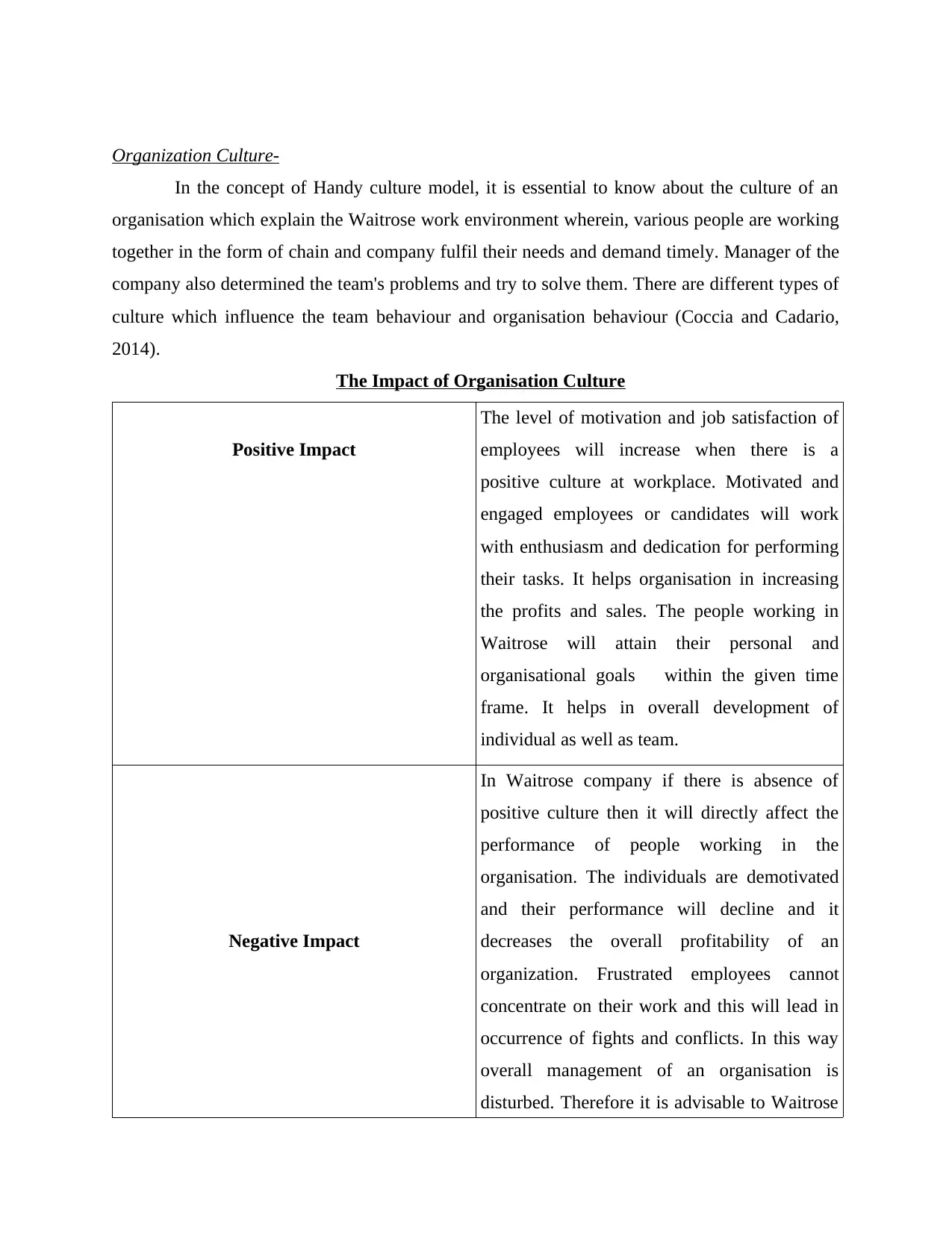
Organization Culture-
In the concept of Handy culture model, it is essential to know about the culture of an
organisation which explain the Waitrose work environment wherein, various people are working
together in the form of chain and company fulfil their needs and demand timely. Manager of the
company also determined the team's problems and try to solve them. There are different types of
culture which influence the team behaviour and organisation behaviour (Coccia and Cadario,
2014).
The Impact of Organisation Culture
Positive Impact
The level of motivation and job satisfaction of
employees will increase when there is a
positive culture at workplace. Motivated and
engaged employees or candidates will work
with enthusiasm and dedication for performing
their tasks. It helps organisation in increasing
the profits and sales. The people working in
Waitrose will attain their personal and
organisational goals within the given time
frame. It helps in overall development of
individual as well as team.
Negative Impact
In Waitrose company if there is absence of
positive culture then it will directly affect the
performance of people working in the
organisation. The individuals are demotivated
and their performance will decline and it
decreases the overall profitability of an
organization. Frustrated employees cannot
concentrate on their work and this will lead in
occurrence of fights and conflicts. In this way
overall management of an organisation is
disturbed. Therefore it is advisable to Waitrose
In the concept of Handy culture model, it is essential to know about the culture of an
organisation which explain the Waitrose work environment wherein, various people are working
together in the form of chain and company fulfil their needs and demand timely. Manager of the
company also determined the team's problems and try to solve them. There are different types of
culture which influence the team behaviour and organisation behaviour (Coccia and Cadario,
2014).
The Impact of Organisation Culture
Positive Impact
The level of motivation and job satisfaction of
employees will increase when there is a
positive culture at workplace. Motivated and
engaged employees or candidates will work
with enthusiasm and dedication for performing
their tasks. It helps organisation in increasing
the profits and sales. The people working in
Waitrose will attain their personal and
organisational goals within the given time
frame. It helps in overall development of
individual as well as team.
Negative Impact
In Waitrose company if there is absence of
positive culture then it will directly affect the
performance of people working in the
organisation. The individuals are demotivated
and their performance will decline and it
decreases the overall profitability of an
organization. Frustrated employees cannot
concentrate on their work and this will lead in
occurrence of fights and conflicts. In this way
overall management of an organisation is
disturbed. Therefore it is advisable to Waitrose
Paraphrase This Document
Need a fresh take? Get an instant paraphrase of this document with our AI Paraphraser
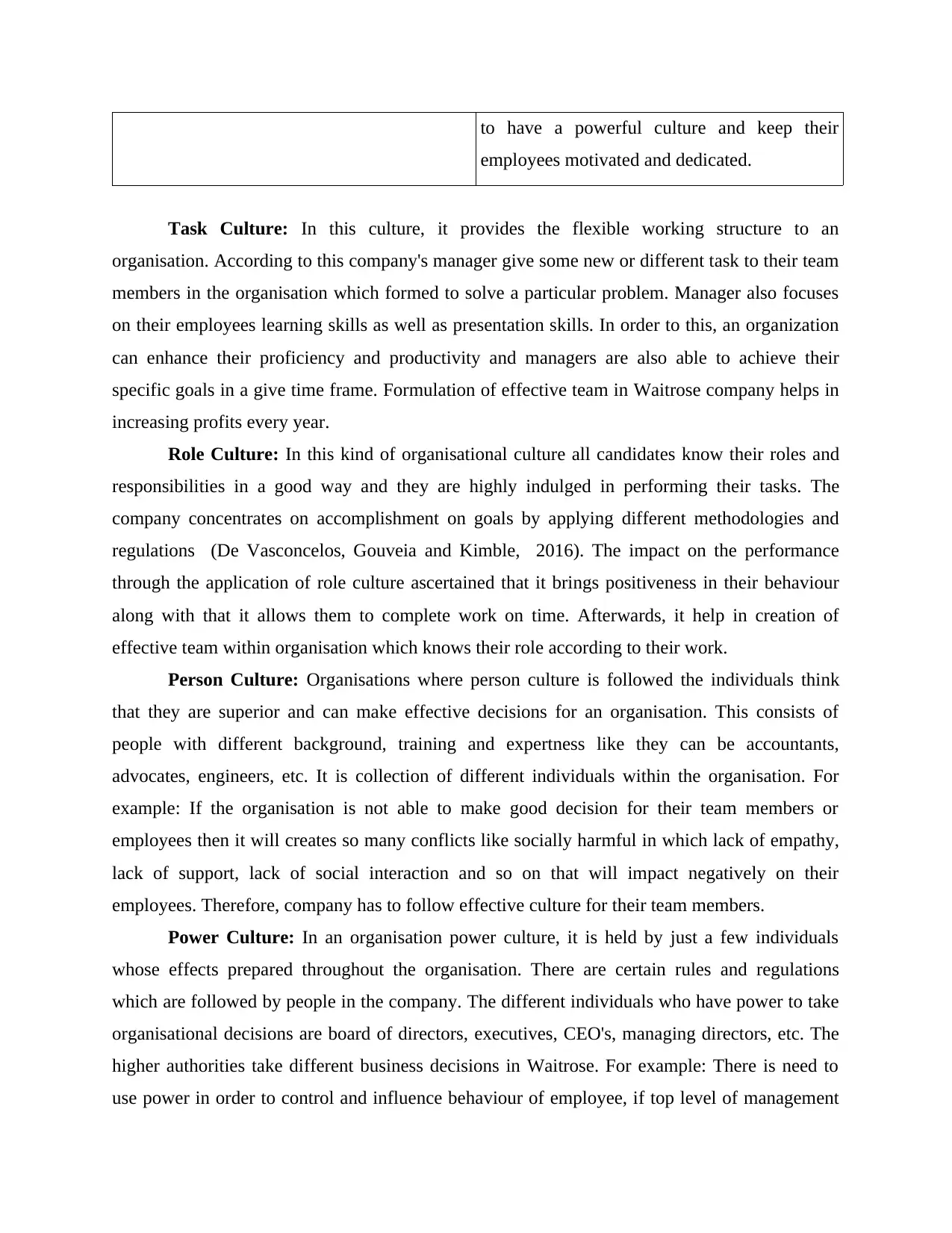
to have a powerful culture and keep their
employees motivated and dedicated.
Task Culture: In this culture, it provides the flexible working structure to an
organisation. According to this company's manager give some new or different task to their team
members in the organisation which formed to solve a particular problem. Manager also focuses
on their employees learning skills as well as presentation skills. In order to this, an organization
can enhance their proficiency and productivity and managers are also able to achieve their
specific goals in a give time frame. Formulation of effective team in Waitrose company helps in
increasing profits every year.
Role Culture: In this kind of organisational culture all candidates know their roles and
responsibilities in a good way and they are highly indulged in performing their tasks. The
company concentrates on accomplishment on goals by applying different methodologies and
regulations (De Vasconcelos, Gouveia and Kimble, 2016). The impact on the performance
through the application of role culture ascertained that it brings positiveness in their behaviour
along with that it allows them to complete work on time. Afterwards, it help in creation of
effective team within organisation which knows their role according to their work.
Person Culture: Organisations where person culture is followed the individuals think
that they are superior and can make effective decisions for an organisation. This consists of
people with different background, training and expertness like they can be accountants,
advocates, engineers, etc. It is collection of different individuals within the organisation. For
example: If the organisation is not able to make good decision for their team members or
employees then it will creates so many conflicts like socially harmful in which lack of empathy,
lack of support, lack of social interaction and so on that will impact negatively on their
employees. Therefore, company has to follow effective culture for their team members.
Power Culture: In an organisation power culture, it is held by just a few individuals
whose effects prepared throughout the organisation. There are certain rules and regulations
which are followed by people in the company. The different individuals who have power to take
organisational decisions are board of directors, executives, CEO's, managing directors, etc. The
higher authorities take different business decisions in Waitrose. For example: There is need to
use power in order to control and influence behaviour of employee, if top level of management
employees motivated and dedicated.
Task Culture: In this culture, it provides the flexible working structure to an
organisation. According to this company's manager give some new or different task to their team
members in the organisation which formed to solve a particular problem. Manager also focuses
on their employees learning skills as well as presentation skills. In order to this, an organization
can enhance their proficiency and productivity and managers are also able to achieve their
specific goals in a give time frame. Formulation of effective team in Waitrose company helps in
increasing profits every year.
Role Culture: In this kind of organisational culture all candidates know their roles and
responsibilities in a good way and they are highly indulged in performing their tasks. The
company concentrates on accomplishment on goals by applying different methodologies and
regulations (De Vasconcelos, Gouveia and Kimble, 2016). The impact on the performance
through the application of role culture ascertained that it brings positiveness in their behaviour
along with that it allows them to complete work on time. Afterwards, it help in creation of
effective team within organisation which knows their role according to their work.
Person Culture: Organisations where person culture is followed the individuals think
that they are superior and can make effective decisions for an organisation. This consists of
people with different background, training and expertness like they can be accountants,
advocates, engineers, etc. It is collection of different individuals within the organisation. For
example: If the organisation is not able to make good decision for their team members or
employees then it will creates so many conflicts like socially harmful in which lack of empathy,
lack of support, lack of social interaction and so on that will impact negatively on their
employees. Therefore, company has to follow effective culture for their team members.
Power Culture: In an organisation power culture, it is held by just a few individuals
whose effects prepared throughout the organisation. There are certain rules and regulations
which are followed by people in the company. The different individuals who have power to take
organisational decisions are board of directors, executives, CEO's, managing directors, etc. The
higher authorities take different business decisions in Waitrose. For example: There is need to
use power in order to control and influence behaviour of employee, if top level of management
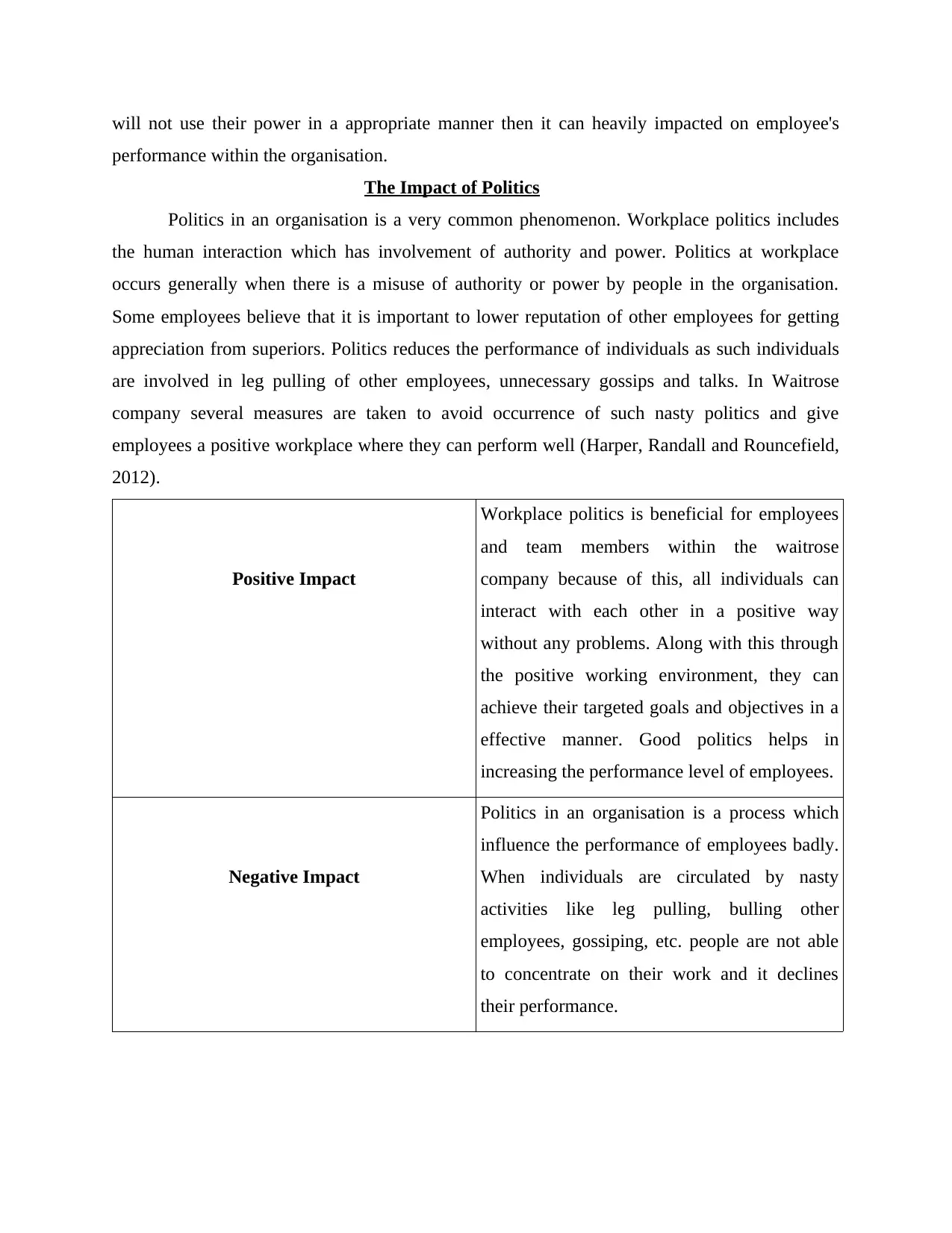
will not use their power in a appropriate manner then it can heavily impacted on employee's
performance within the organisation.
The Impact of Politics
Politics in an organisation is a very common phenomenon. Workplace politics includes
the human interaction which has involvement of authority and power. Politics at workplace
occurs generally when there is a misuse of authority or power by people in the organisation.
Some employees believe that it is important to lower reputation of other employees for getting
appreciation from superiors. Politics reduces the performance of individuals as such individuals
are involved in leg pulling of other employees, unnecessary gossips and talks. In Waitrose
company several measures are taken to avoid occurrence of such nasty politics and give
employees a positive workplace where they can perform well (Harper, Randall and Rouncefield,
2012).
Positive Impact
Workplace politics is beneficial for employees
and team members within the waitrose
company because of this, all individuals can
interact with each other in a positive way
without any problems. Along with this through
the positive working environment, they can
achieve their targeted goals and objectives in a
effective manner. Good politics helps in
increasing the performance level of employees.
Negative Impact
Politics in an organisation is a process which
influence the performance of employees badly.
When individuals are circulated by nasty
activities like leg pulling, bulling other
employees, gossiping, etc. people are not able
to concentrate on their work and it declines
their performance.
performance within the organisation.
The Impact of Politics
Politics in an organisation is a very common phenomenon. Workplace politics includes
the human interaction which has involvement of authority and power. Politics at workplace
occurs generally when there is a misuse of authority or power by people in the organisation.
Some employees believe that it is important to lower reputation of other employees for getting
appreciation from superiors. Politics reduces the performance of individuals as such individuals
are involved in leg pulling of other employees, unnecessary gossips and talks. In Waitrose
company several measures are taken to avoid occurrence of such nasty politics and give
employees a positive workplace where they can perform well (Harper, Randall and Rouncefield,
2012).
Positive Impact
Workplace politics is beneficial for employees
and team members within the waitrose
company because of this, all individuals can
interact with each other in a positive way
without any problems. Along with this through
the positive working environment, they can
achieve their targeted goals and objectives in a
effective manner. Good politics helps in
increasing the performance level of employees.
Negative Impact
Politics in an organisation is a process which
influence the performance of employees badly.
When individuals are circulated by nasty
activities like leg pulling, bulling other
employees, gossiping, etc. people are not able
to concentrate on their work and it declines
their performance.
⊘ This is a preview!⊘
Do you want full access?
Subscribe today to unlock all pages.

Trusted by 1+ million students worldwide
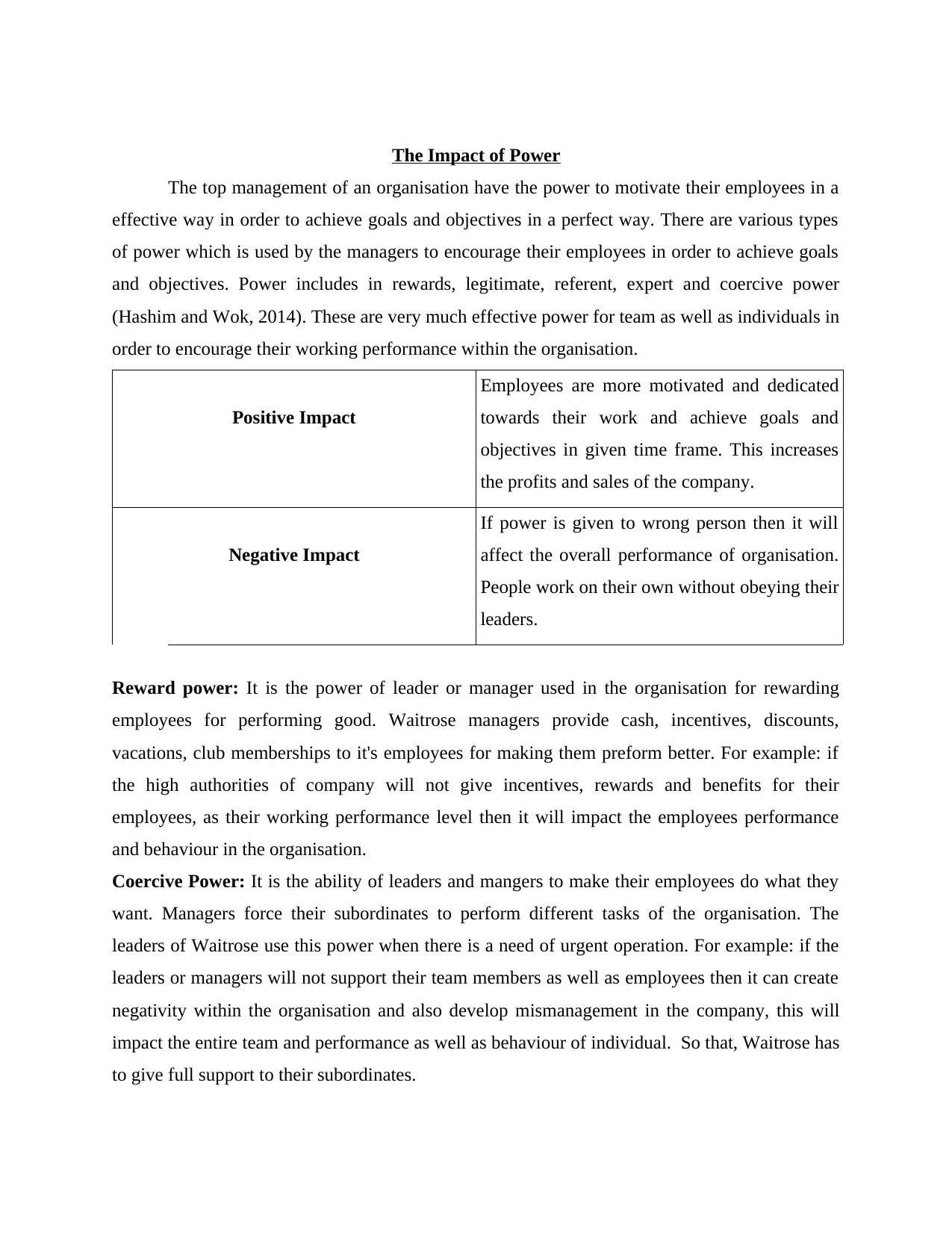
The Impact of Power
The top management of an organisation have the power to motivate their employees in a
effective way in order to achieve goals and objectives in a perfect way. There are various types
of power which is used by the managers to encourage their employees in order to achieve goals
and objectives. Power includes in rewards, legitimate, referent, expert and coercive power
(Hashim and Wok, 2014). These are very much effective power for team as well as individuals in
order to encourage their working performance within the organisation.
Positive Impact
Employees are more motivated and dedicated
towards their work and achieve goals and
objectives in given time frame. This increases
the profits and sales of the company.
Negative Impact
If power is given to wrong person then it will
affect the overall performance of organisation.
People work on their own without obeying their
leaders.
Reward power: It is the power of leader or manager used in the organisation for rewarding
employees for performing good. Waitrose managers provide cash, incentives, discounts,
vacations, club memberships to it's employees for making them preform better. For example: if
the high authorities of company will not give incentives, rewards and benefits for their
employees, as their working performance level then it will impact the employees performance
and behaviour in the organisation.
Coercive Power: It is the ability of leaders and mangers to make their employees do what they
want. Managers force their subordinates to perform different tasks of the organisation. The
leaders of Waitrose use this power when there is a need of urgent operation. For example: if the
leaders or managers will not support their team members as well as employees then it can create
negativity within the organisation and also develop mismanagement in the company, this will
impact the entire team and performance as well as behaviour of individual. So that, Waitrose has
to give full support to their subordinates.
The top management of an organisation have the power to motivate their employees in a
effective way in order to achieve goals and objectives in a perfect way. There are various types
of power which is used by the managers to encourage their employees in order to achieve goals
and objectives. Power includes in rewards, legitimate, referent, expert and coercive power
(Hashim and Wok, 2014). These are very much effective power for team as well as individuals in
order to encourage their working performance within the organisation.
Positive Impact
Employees are more motivated and dedicated
towards their work and achieve goals and
objectives in given time frame. This increases
the profits and sales of the company.
Negative Impact
If power is given to wrong person then it will
affect the overall performance of organisation.
People work on their own without obeying their
leaders.
Reward power: It is the power of leader or manager used in the organisation for rewarding
employees for performing good. Waitrose managers provide cash, incentives, discounts,
vacations, club memberships to it's employees for making them preform better. For example: if
the high authorities of company will not give incentives, rewards and benefits for their
employees, as their working performance level then it will impact the employees performance
and behaviour in the organisation.
Coercive Power: It is the ability of leaders and mangers to make their employees do what they
want. Managers force their subordinates to perform different tasks of the organisation. The
leaders of Waitrose use this power when there is a need of urgent operation. For example: if the
leaders or managers will not support their team members as well as employees then it can create
negativity within the organisation and also develop mismanagement in the company, this will
impact the entire team and performance as well as behaviour of individual. So that, Waitrose has
to give full support to their subordinates.
Paraphrase This Document
Need a fresh take? Get an instant paraphrase of this document with our AI Paraphraser
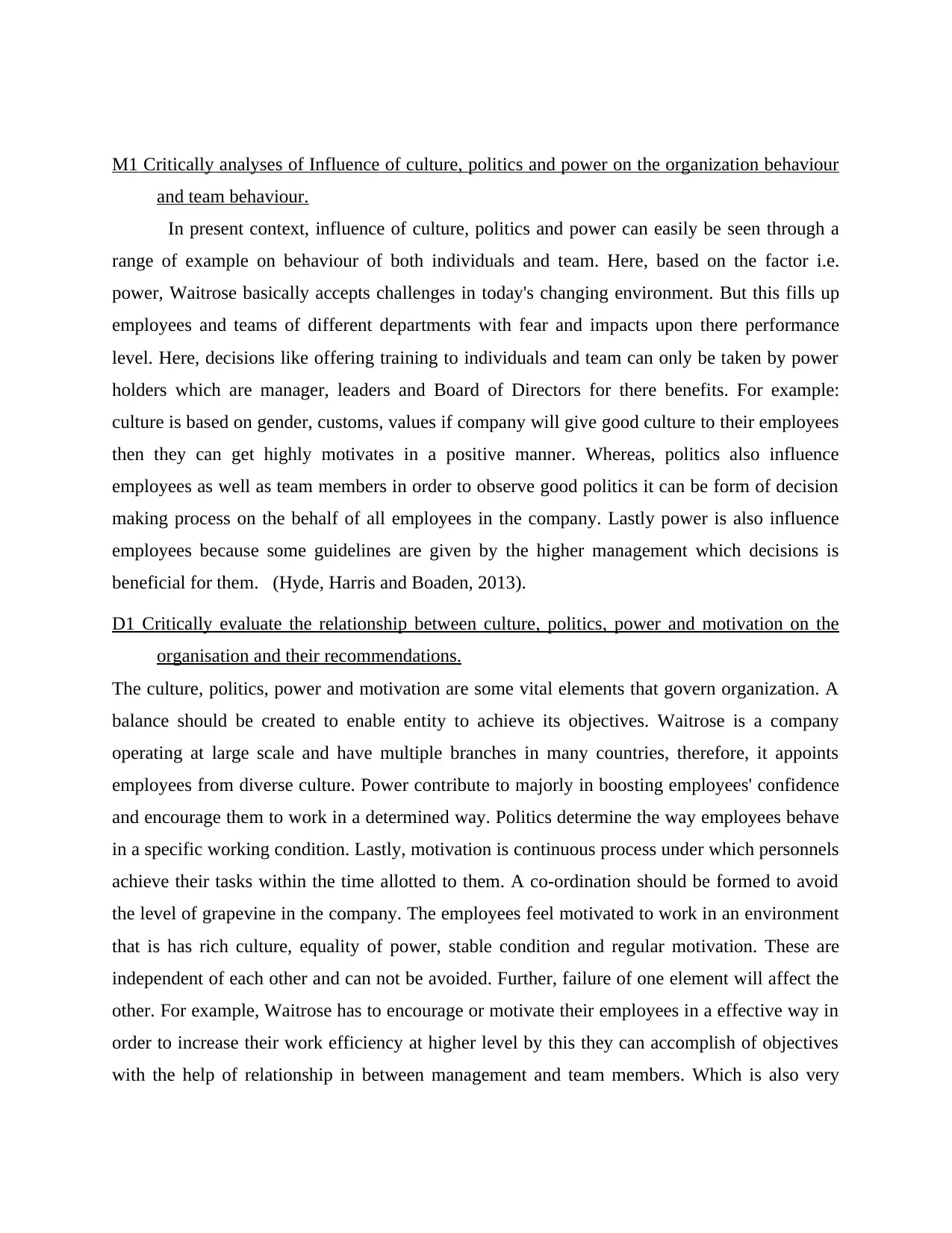
M1 Critically analyses of Influence of culture, politics and power on the organization behaviour
and team behaviour.
In present context, influence of culture, politics and power can easily be seen through a
range of example on behaviour of both individuals and team. Here, based on the factor i.e.
power, Waitrose basically accepts challenges in today's changing environment. But this fills up
employees and teams of different departments with fear and impacts upon there performance
level. Here, decisions like offering training to individuals and team can only be taken by power
holders which are manager, leaders and Board of Directors for there benefits. For example:
culture is based on gender, customs, values if company will give good culture to their employees
then they can get highly motivates in a positive manner. Whereas, politics also influence
employees as well as team members in order to observe good politics it can be form of decision
making process on the behalf of all employees in the company. Lastly power is also influence
employees because some guidelines are given by the higher management which decisions is
beneficial for them. (Hyde, Harris and Boaden, 2013).
D1 Critically evaluate the relationship between culture, politics, power and motivation on the
organisation and their recommendations.
The culture, politics, power and motivation are some vital elements that govern organization. A
balance should be created to enable entity to achieve its objectives. Waitrose is a company
operating at large scale and have multiple branches in many countries, therefore, it appoints
employees from diverse culture. Power contribute to majorly in boosting employees' confidence
and encourage them to work in a determined way. Politics determine the way employees behave
in a specific working condition. Lastly, motivation is continuous process under which personnels
achieve their tasks within the time allotted to them. A co-ordination should be formed to avoid
the level of grapevine in the company. The employees feel motivated to work in an environment
that is has rich culture, equality of power, stable condition and regular motivation. These are
independent of each other and can not be avoided. Further, failure of one element will affect the
other. For example, Waitrose has to encourage or motivate their employees in a effective way in
order to increase their work efficiency at higher level by this they can accomplish of objectives
with the help of relationship in between management and team members. Which is also very
and team behaviour.
In present context, influence of culture, politics and power can easily be seen through a
range of example on behaviour of both individuals and team. Here, based on the factor i.e.
power, Waitrose basically accepts challenges in today's changing environment. But this fills up
employees and teams of different departments with fear and impacts upon there performance
level. Here, decisions like offering training to individuals and team can only be taken by power
holders which are manager, leaders and Board of Directors for there benefits. For example:
culture is based on gender, customs, values if company will give good culture to their employees
then they can get highly motivates in a positive manner. Whereas, politics also influence
employees as well as team members in order to observe good politics it can be form of decision
making process on the behalf of all employees in the company. Lastly power is also influence
employees because some guidelines are given by the higher management which decisions is
beneficial for them. (Hyde, Harris and Boaden, 2013).
D1 Critically evaluate the relationship between culture, politics, power and motivation on the
organisation and their recommendations.
The culture, politics, power and motivation are some vital elements that govern organization. A
balance should be created to enable entity to achieve its objectives. Waitrose is a company
operating at large scale and have multiple branches in many countries, therefore, it appoints
employees from diverse culture. Power contribute to majorly in boosting employees' confidence
and encourage them to work in a determined way. Politics determine the way employees behave
in a specific working condition. Lastly, motivation is continuous process under which personnels
achieve their tasks within the time allotted to them. A co-ordination should be formed to avoid
the level of grapevine in the company. The employees feel motivated to work in an environment
that is has rich culture, equality of power, stable condition and regular motivation. These are
independent of each other and can not be avoided. Further, failure of one element will affect the
other. For example, Waitrose has to encourage or motivate their employees in a effective way in
order to increase their work efficiency at higher level by this they can accomplish of objectives
with the help of relationship in between management and team members. Which is also very
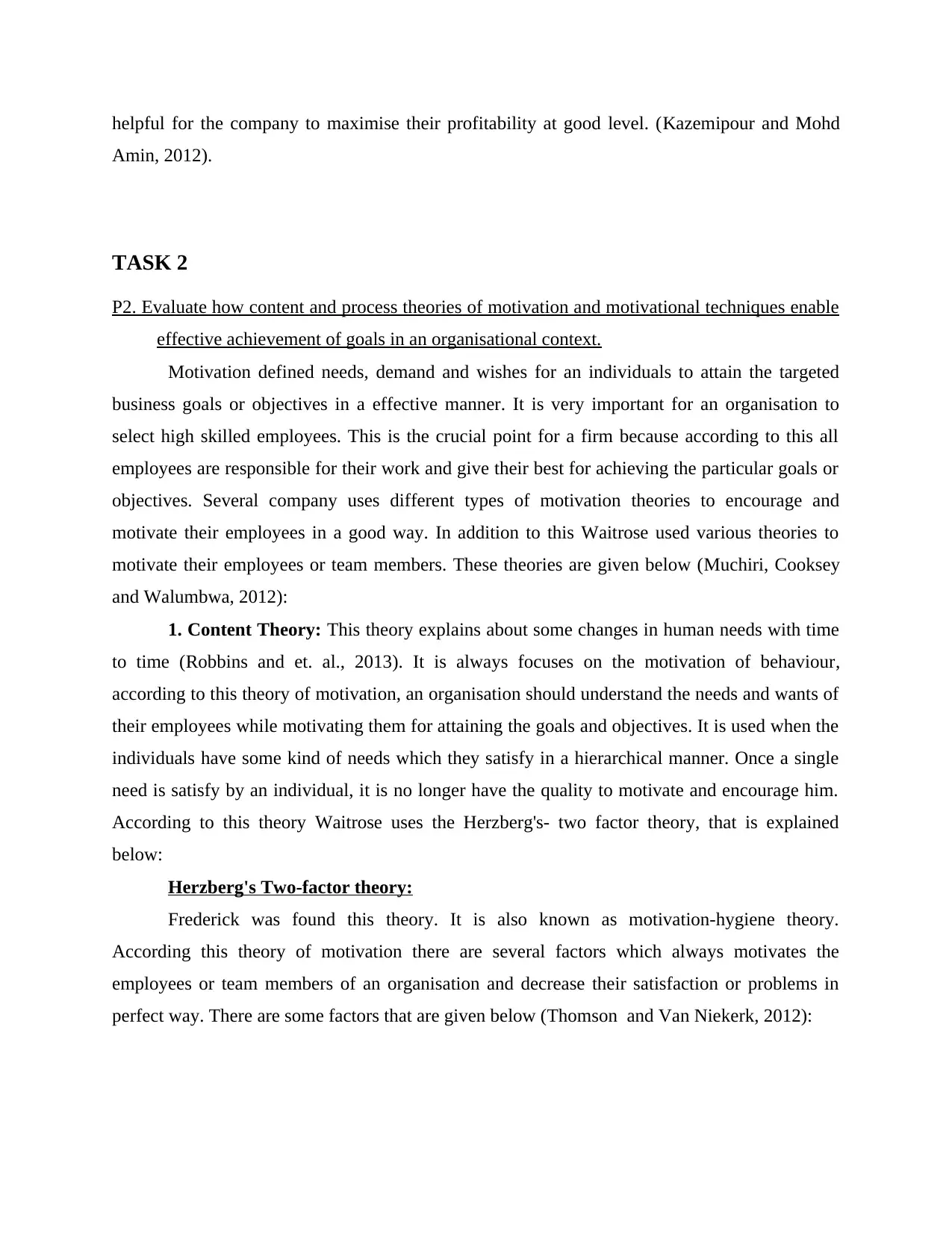
helpful for the company to maximise their profitability at good level. (Kazemipour and Mohd
Amin, 2012).
TASK 2
P2. Evaluate how content and process theories of motivation and motivational techniques enable
effective achievement of goals in an organisational context.
Motivation defined needs, demand and wishes for an individuals to attain the targeted
business goals or objectives in a effective manner. It is very important for an organisation to
select high skilled employees. This is the crucial point for a firm because according to this all
employees are responsible for their work and give their best for achieving the particular goals or
objectives. Several company uses different types of motivation theories to encourage and
motivate their employees in a good way. In addition to this Waitrose used various theories to
motivate their employees or team members. These theories are given below (Muchiri, Cooksey
and Walumbwa, 2012):
1. Content Theory: This theory explains about some changes in human needs with time
to time (Robbins and et. al., 2013). It is always focuses on the motivation of behaviour,
according to this theory of motivation, an organisation should understand the needs and wants of
their employees while motivating them for attaining the goals and objectives. It is used when the
individuals have some kind of needs which they satisfy in a hierarchical manner. Once a single
need is satisfy by an individual, it is no longer have the quality to motivate and encourage him.
According to this theory Waitrose uses the Herzberg's- two factor theory, that is explained
below:
Herzberg's Two-factor theory:
Frederick was found this theory. It is also known as motivation-hygiene theory.
According this theory of motivation there are several factors which always motivates the
employees or team members of an organisation and decrease their satisfaction or problems in
perfect way. There are some factors that are given below (Thomson and Van Niekerk, 2012):
Amin, 2012).
TASK 2
P2. Evaluate how content and process theories of motivation and motivational techniques enable
effective achievement of goals in an organisational context.
Motivation defined needs, demand and wishes for an individuals to attain the targeted
business goals or objectives in a effective manner. It is very important for an organisation to
select high skilled employees. This is the crucial point for a firm because according to this all
employees are responsible for their work and give their best for achieving the particular goals or
objectives. Several company uses different types of motivation theories to encourage and
motivate their employees in a good way. In addition to this Waitrose used various theories to
motivate their employees or team members. These theories are given below (Muchiri, Cooksey
and Walumbwa, 2012):
1. Content Theory: This theory explains about some changes in human needs with time
to time (Robbins and et. al., 2013). It is always focuses on the motivation of behaviour,
according to this theory of motivation, an organisation should understand the needs and wants of
their employees while motivating them for attaining the goals and objectives. It is used when the
individuals have some kind of needs which they satisfy in a hierarchical manner. Once a single
need is satisfy by an individual, it is no longer have the quality to motivate and encourage him.
According to this theory Waitrose uses the Herzberg's- two factor theory, that is explained
below:
Herzberg's Two-factor theory:
Frederick was found this theory. It is also known as motivation-hygiene theory.
According this theory of motivation there are several factors which always motivates the
employees or team members of an organisation and decrease their satisfaction or problems in
perfect way. There are some factors that are given below (Thomson and Van Niekerk, 2012):
⊘ This is a preview!⊘
Do you want full access?
Subscribe today to unlock all pages.

Trusted by 1+ million students worldwide
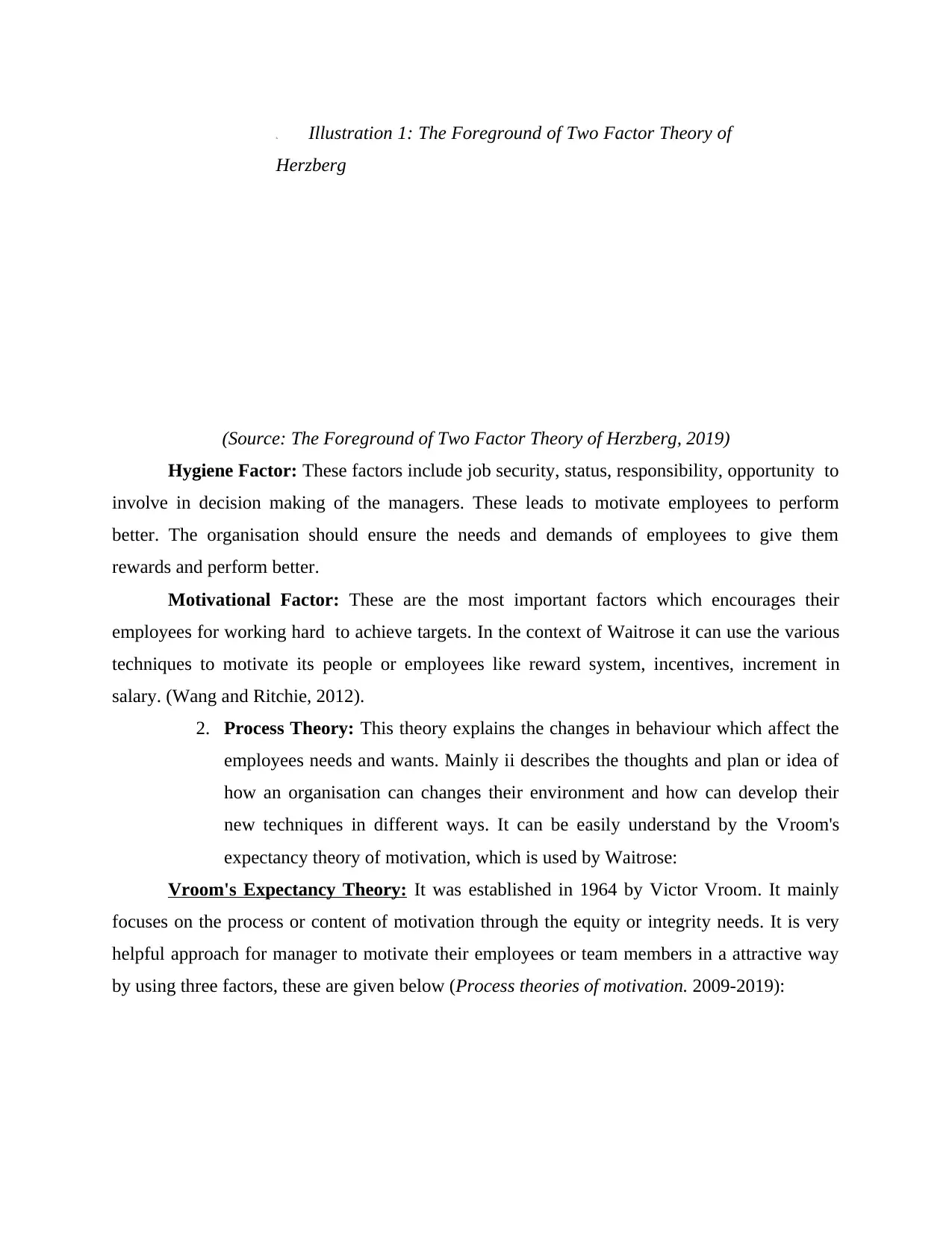
Illustration 1: The Foreground of Two Factor Theory of
Herzberg
(Source: The Foreground of Two Factor Theory of Herzberg, 2019)
Hygiene Factor: These factors include job security, status, responsibility, opportunity to
involve in decision making of the managers. These leads to motivate employees to perform
better. The organisation should ensure the needs and demands of employees to give them
rewards and perform better.
Motivational Factor: These are the most important factors which encourages their
employees for working hard to achieve targets. In the context of Waitrose it can use the various
techniques to motivate its people or employees like reward system, incentives, increment in
salary. (Wang and Ritchie, 2012).
2. Process Theory: This theory explains the changes in behaviour which affect the
employees needs and wants. Mainly ii describes the thoughts and plan or idea of
how an organisation can changes their environment and how can develop their
new techniques in different ways. It can be easily understand by the Vroom's
expectancy theory of motivation, which is used by Waitrose:
Vroom's Expectancy Theory: It was established in 1964 by Victor Vroom. It mainly
focuses on the process or content of motivation through the equity or integrity needs. It is very
helpful approach for manager to motivate their employees or team members in a attractive way
by using three factors, these are given below (Process theories of motivation. 2009-2019):
Herzberg
(Source: The Foreground of Two Factor Theory of Herzberg, 2019)
Hygiene Factor: These factors include job security, status, responsibility, opportunity to
involve in decision making of the managers. These leads to motivate employees to perform
better. The organisation should ensure the needs and demands of employees to give them
rewards and perform better.
Motivational Factor: These are the most important factors which encourages their
employees for working hard to achieve targets. In the context of Waitrose it can use the various
techniques to motivate its people or employees like reward system, incentives, increment in
salary. (Wang and Ritchie, 2012).
2. Process Theory: This theory explains the changes in behaviour which affect the
employees needs and wants. Mainly ii describes the thoughts and plan or idea of
how an organisation can changes their environment and how can develop their
new techniques in different ways. It can be easily understand by the Vroom's
expectancy theory of motivation, which is used by Waitrose:
Vroom's Expectancy Theory: It was established in 1964 by Victor Vroom. It mainly
focuses on the process or content of motivation through the equity or integrity needs. It is very
helpful approach for manager to motivate their employees or team members in a attractive way
by using three factors, these are given below (Process theories of motivation. 2009-2019):
Paraphrase This Document
Need a fresh take? Get an instant paraphrase of this document with our AI Paraphraser
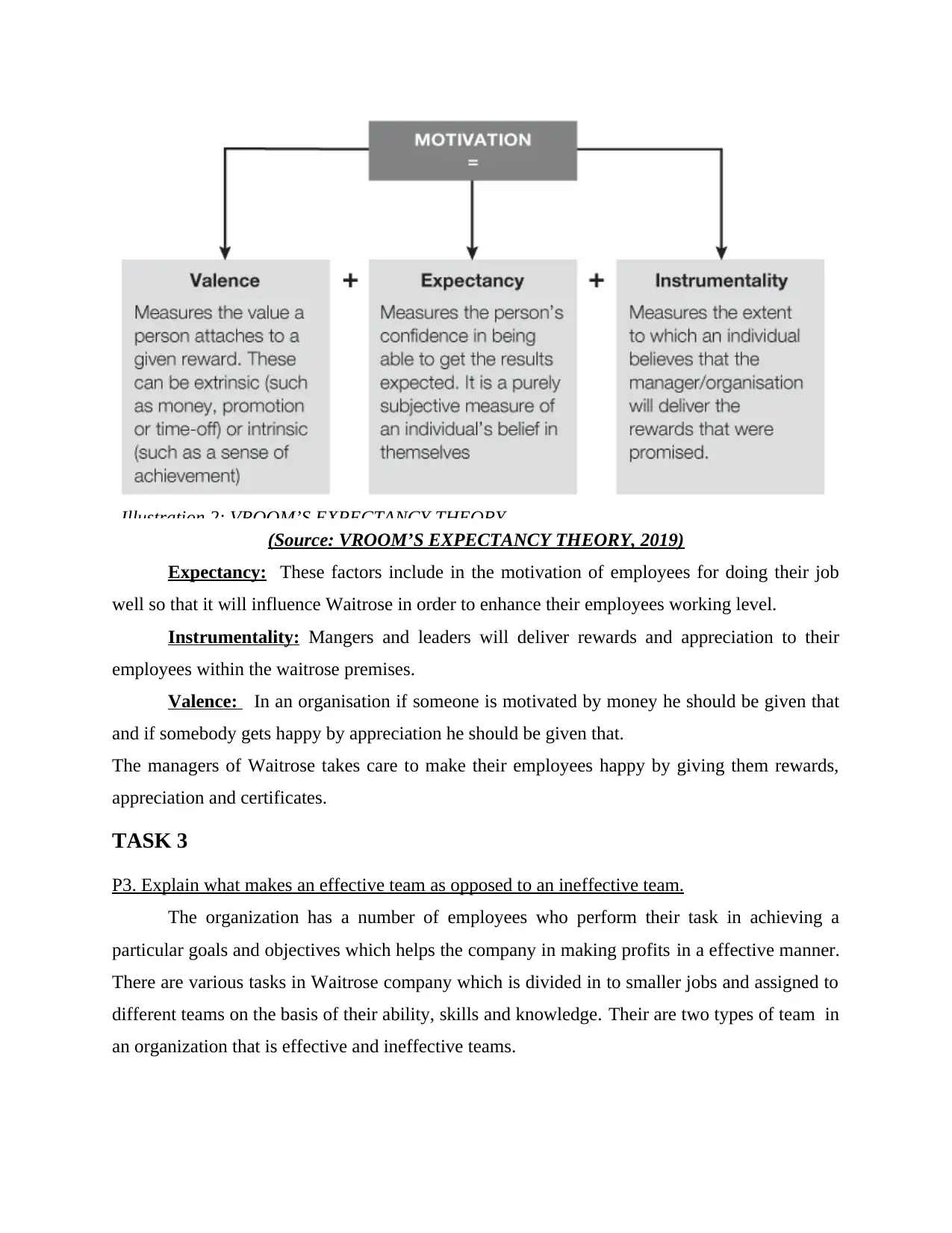
(Source: VROOM’S EXPECTANCY THEORY, 2019)
Expectancy: These factors include in the motivation of employees for doing their job
well so that it will influence Waitrose in order to enhance their employees working level.
Instrumentality: Mangers and leaders will deliver rewards and appreciation to their
employees within the waitrose premises.
Valence: In an organisation if someone is motivated by money he should be given that
and if somebody gets happy by appreciation he should be given that.
The managers of Waitrose takes care to make their employees happy by giving them rewards,
appreciation and certificates.
TASK 3
P3. Explain what makes an effective team as opposed to an ineffective team.
The organization has a number of employees who perform their task in achieving a
particular goals and objectives which helps the company in making profits in a effective manner.
There are various tasks in Waitrose company which is divided in to smaller jobs and assigned to
different teams on the basis of their ability, skills and knowledge. Their are two types of team in
an organization that is effective and ineffective teams.
Illustration 2: VROOM’S EXPECTANCY THEORY
Expectancy: These factors include in the motivation of employees for doing their job
well so that it will influence Waitrose in order to enhance their employees working level.
Instrumentality: Mangers and leaders will deliver rewards and appreciation to their
employees within the waitrose premises.
Valence: In an organisation if someone is motivated by money he should be given that
and if somebody gets happy by appreciation he should be given that.
The managers of Waitrose takes care to make their employees happy by giving them rewards,
appreciation and certificates.
TASK 3
P3. Explain what makes an effective team as opposed to an ineffective team.
The organization has a number of employees who perform their task in achieving a
particular goals and objectives which helps the company in making profits in a effective manner.
There are various tasks in Waitrose company which is divided in to smaller jobs and assigned to
different teams on the basis of their ability, skills and knowledge. Their are two types of team in
an organization that is effective and ineffective teams.
Illustration 2: VROOM’S EXPECTANCY THEORY
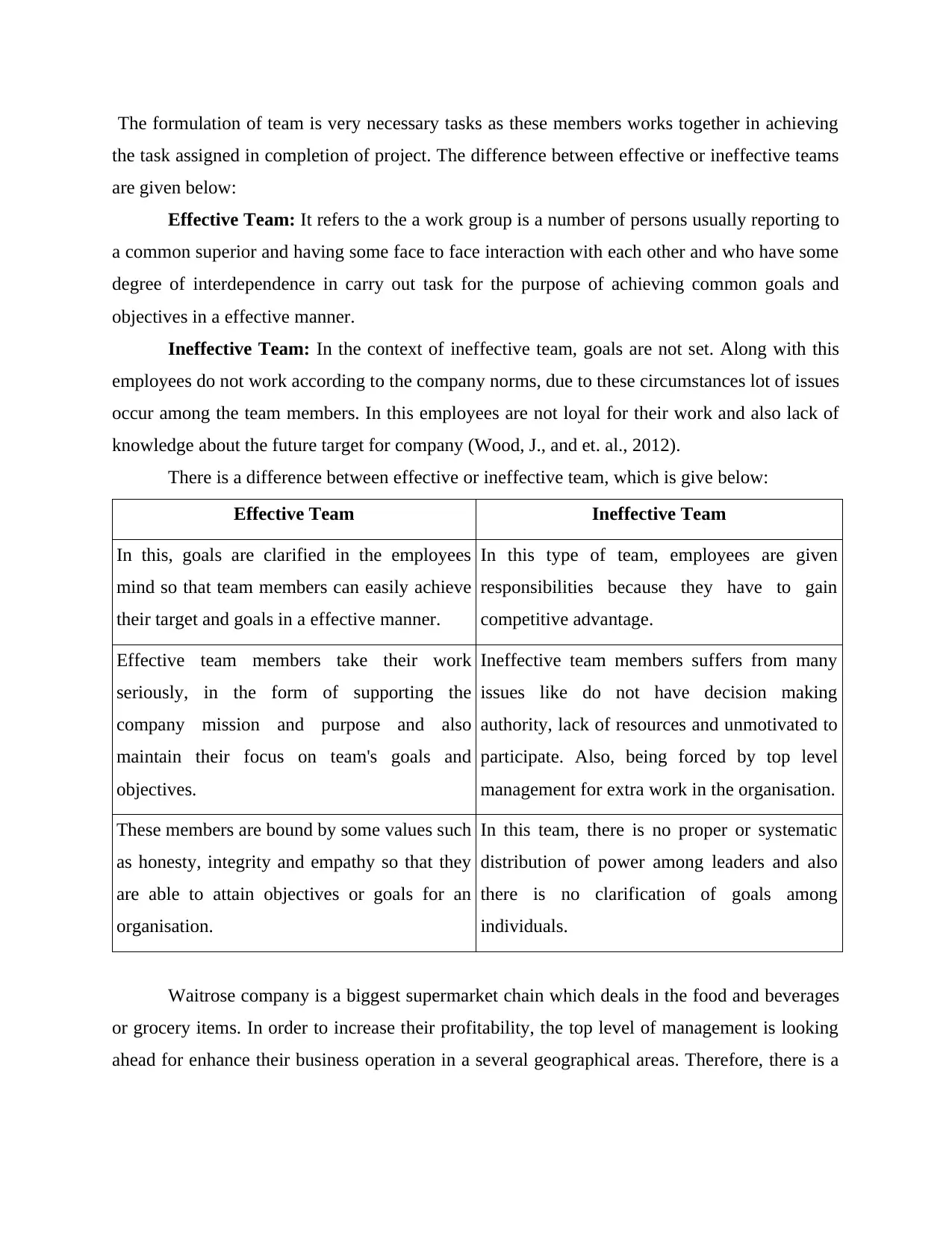
The formulation of team is very necessary tasks as these members works together in achieving
the task assigned in completion of project. The difference between effective or ineffective teams
are given below:
Effective Team: It refers to the a work group is a number of persons usually reporting to
a common superior and having some face to face interaction with each other and who have some
degree of interdependence in carry out task for the purpose of achieving common goals and
objectives in a effective manner.
Ineffective Team: In the context of ineffective team, goals are not set. Along with this
employees do not work according to the company norms, due to these circumstances lot of issues
occur among the team members. In this employees are not loyal for their work and also lack of
knowledge about the future target for company (Wood, J., and et. al., 2012).
There is a difference between effective or ineffective team, which is give below:
Effective Team Ineffective Team
In this, goals are clarified in the employees
mind so that team members can easily achieve
their target and goals in a effective manner.
In this type of team, employees are given
responsibilities because they have to gain
competitive advantage.
Effective team members take their work
seriously, in the form of supporting the
company mission and purpose and also
maintain their focus on team's goals and
objectives.
Ineffective team members suffers from many
issues like do not have decision making
authority, lack of resources and unmotivated to
participate. Also, being forced by top level
management for extra work in the organisation.
These members are bound by some values such
as honesty, integrity and empathy so that they
are able to attain objectives or goals for an
organisation.
In this team, there is no proper or systematic
distribution of power among leaders and also
there is no clarification of goals among
individuals.
Waitrose company is a biggest supermarket chain which deals in the food and beverages
or grocery items. In order to increase their profitability, the top level of management is looking
ahead for enhance their business operation in a several geographical areas. Therefore, there is a
the task assigned in completion of project. The difference between effective or ineffective teams
are given below:
Effective Team: It refers to the a work group is a number of persons usually reporting to
a common superior and having some face to face interaction with each other and who have some
degree of interdependence in carry out task for the purpose of achieving common goals and
objectives in a effective manner.
Ineffective Team: In the context of ineffective team, goals are not set. Along with this
employees do not work according to the company norms, due to these circumstances lot of issues
occur among the team members. In this employees are not loyal for their work and also lack of
knowledge about the future target for company (Wood, J., and et. al., 2012).
There is a difference between effective or ineffective team, which is give below:
Effective Team Ineffective Team
In this, goals are clarified in the employees
mind so that team members can easily achieve
their target and goals in a effective manner.
In this type of team, employees are given
responsibilities because they have to gain
competitive advantage.
Effective team members take their work
seriously, in the form of supporting the
company mission and purpose and also
maintain their focus on team's goals and
objectives.
Ineffective team members suffers from many
issues like do not have decision making
authority, lack of resources and unmotivated to
participate. Also, being forced by top level
management for extra work in the organisation.
These members are bound by some values such
as honesty, integrity and empathy so that they
are able to attain objectives or goals for an
organisation.
In this team, there is no proper or systematic
distribution of power among leaders and also
there is no clarification of goals among
individuals.
Waitrose company is a biggest supermarket chain which deals in the food and beverages
or grocery items. In order to increase their profitability, the top level of management is looking
ahead for enhance their business operation in a several geographical areas. Therefore, there is a
⊘ This is a preview!⊘
Do you want full access?
Subscribe today to unlock all pages.

Trusted by 1+ million students worldwide
1 out of 20
Related Documents
Your All-in-One AI-Powered Toolkit for Academic Success.
+13062052269
info@desklib.com
Available 24*7 on WhatsApp / Email
![[object Object]](/_next/static/media/star-bottom.7253800d.svg)
Unlock your academic potential
Copyright © 2020–2026 A2Z Services. All Rights Reserved. Developed and managed by ZUCOL.




